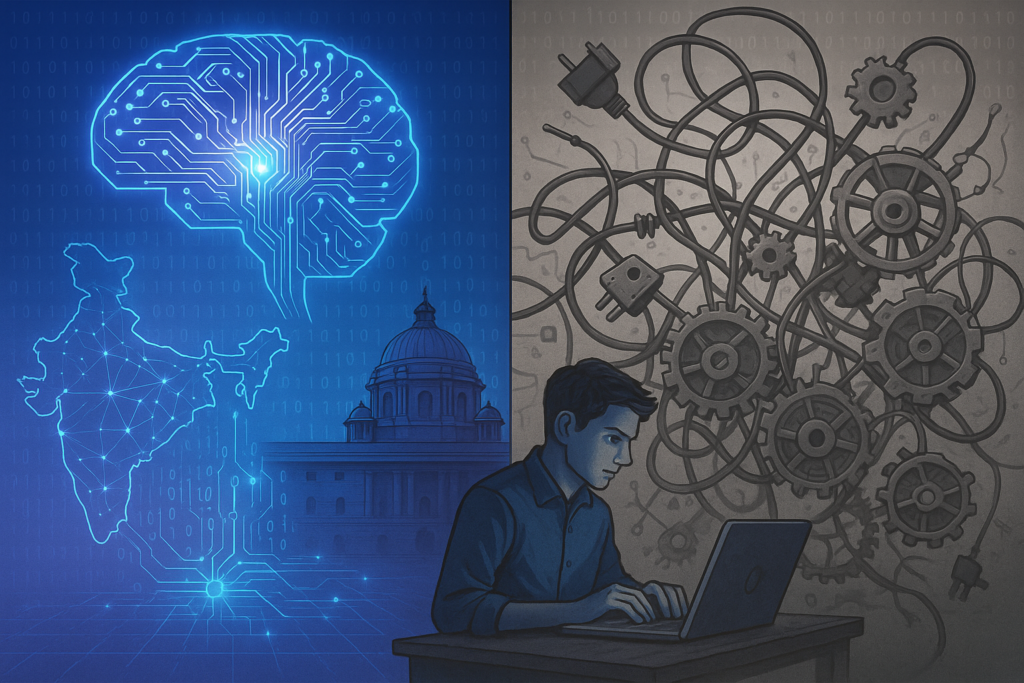
- India may have the ambition, but it lacks the strategic depth and governance infrastructure needed to truly lead in AI.
- While missions are excellent for executing specific objectives, they require a strategic foundation to be effective.
- The U.S. and the U.K. have established standing committees, public hearings, and regulatory frameworks to ensure democratic oversight.
- AI is too important to be left to bureaucrats and tech boards—it must be democratised—strategically, socially, and politically.
As the world accelerates toward an AI-powered future, India is at a critical crossroads. With its booming digital economy, a young and ambitious workforce, and its emerging global stature, the country has all the ingredients to become a leader in artificial intelligence. Yet, despite significant government investments and international commitments, India’s AI journey is being guided more by administrative momentum than by a coherent national strategy. And that’s a risky path.
A recent report from The Public Record, titled “Governing AI in India: Why Strategy Must Precede Mission,” delivers a sobering assessment: India may have the ambition, but it lacks the strategic depth and governance infrastructure needed to truly lead in AI.
The Core Problem: Mission Without a Mandate
In 2024, the Indian government launched the ₹10,371 crore India AI Mission under the Ministry of Electronics and IT. It’s a bold step forward—but without a Cabinet-endorsed national strategy or an empowered coordinating body, it’s like building a ship without a compass.
While missions are excellent for executing specific objectives, they require a strategic foundation to be effective. Today, India’s AI governance operates in silos, with limited coordination across ministries or sectors. There’s no overarching roadmap or political consensus—both critical for long-term success in a domain that intersects with everything from national security to employment and ethics.
A startling 65,000 jobs were lost across top firms like TCS, Infosys, and Wipro in 2024 alone.
Why AI Needs to Be Treated Differently
Unlike the IT revolution of the 1990s, which mainly enabled private-sector growth, AI is a general-purpose, transformative technology. It is reshaping warfare, healthcare, education, transportation, and the job market. Managing such a powerful force can’t be left to scattered administrative programs.
India’s structural challenges are serious:
- Weak AI R&D base: Few Indian universities are in global AI rankings, and most AI researchers still leave the country for better opportunities.
- Limited private sector innovation: Most Indian tech firms focus on services and consumer apps, not deep tech or foundational AI research.
- Minimal defence AI integration: While global powers embed AI into military and cyber capabilities, India is just getting started.
- Brain drain continues: Without incentives or institutional support, our best minds continue to build careers elsewhere.
Jobs, Youth, and the Missing Social Safety Net
Perhaps the most urgent issue is AI’s impact on jobs. The Indian economy, heavily reliant on IT services and BPOs, is staring down the barrel of automation. A startling 65,000 jobs were lost across top firms like TCS, Infosys, and Wipro in 2024 alone. AI-driven tools are already replacing routine coding and customer support roles. And yet, current policy frameworks barely acknowledge this disruption.
According to the IMF, over 26% of India’s workforce is exposed to generative AI risk. LinkedIn executives warn that AI is “breaking the bottom rungs of the career ladder.” But without a structured national response—such as reskilling, social safety nets, and education reform—India could face mass underemployment among its youth.
Visual Insight: Projected AI Impact on Indian White-Collar Jobs (2024–2030)

The Role of Parliament: Present but Passive
Parliamentary engagement with AI has been reactive at best. Less than 1% of questions in both Houses between 2019 and 2025 mentioned AI. And while some MPs have raised concerns—ranging from job loss to deep fakes—the discussion lacks structure, urgency, and follow-through.
In contrast, countries like the U.S. and the U.K. have established standing committees, public hearings, and regulatory frameworks to ensure democratic oversight. India needs a Standing Committee on AI and Emerging Tech to do the same.
Expert panels advising the government include industry leaders, but little representation from civil society, labour groups, or academia.
Data and Democracy: The Trust Deficit
AI thrives on data. But how that data is collected, curated, and governed remains unclear in India. Without transparent frameworks, public trust will erode, especially as AI tools make their way into sensitive areas like healthcare, policing, and public welfare. We’re already seeing signs of technocratic opacity. Expert panels advising the government include industry leaders, but little representation from civil society, labour groups, or academia. If India wants to avoid the mistakes of unchecked digital capitalism, it must prioritise democratic data governance.
What India Needs: A Strategic AI Framework
The report outlines a strong case for a National AI Strategy anchored in:
- Cabinet-level endorsement
- A nodal AI governance council with cross-sectoral authority
- Public consultation and transparency in policymaking
- Structured investment in skilling, social safety, and education
- Integration of defence, industrial, and ethical AI objectives
Crucially, this strategy must be debated in Parliament. AI should no longer be a backroom policy topic—it must become a national political and developmental priority.
The Way Forward
India’s leadership in the Global Partnership on AI (GPAI) signals its international ambition. But without robust domestic governance, this global position could become hollow. A fragmented policy landscape at home undermines both credibility abroad and equity at home.
AI is too important to be left to bureaucrats and tech boards. It must be democratised—strategically, socially, and politically. The time for a mission-driven, piecemeal approach is over. India needs to lead with a strategy—before it’s led by the consequences of its absence.
Divyanka Tandon holds an M.Tech in Data Analytics from BITS Pilani. With a strong foundation in technology and data interpretation, her work focuses on geopolitical risk analysis and writing articles that make sense of global and national data, trends, and their underlying causes. Views expressed are the author’s own.
